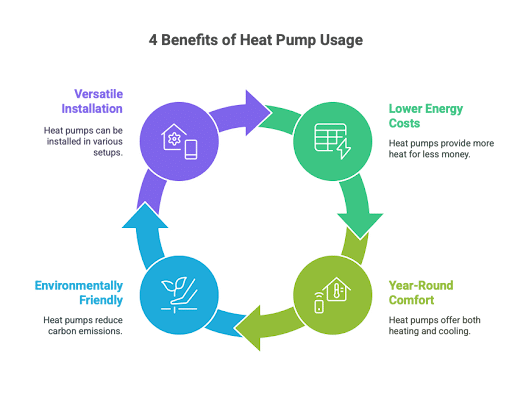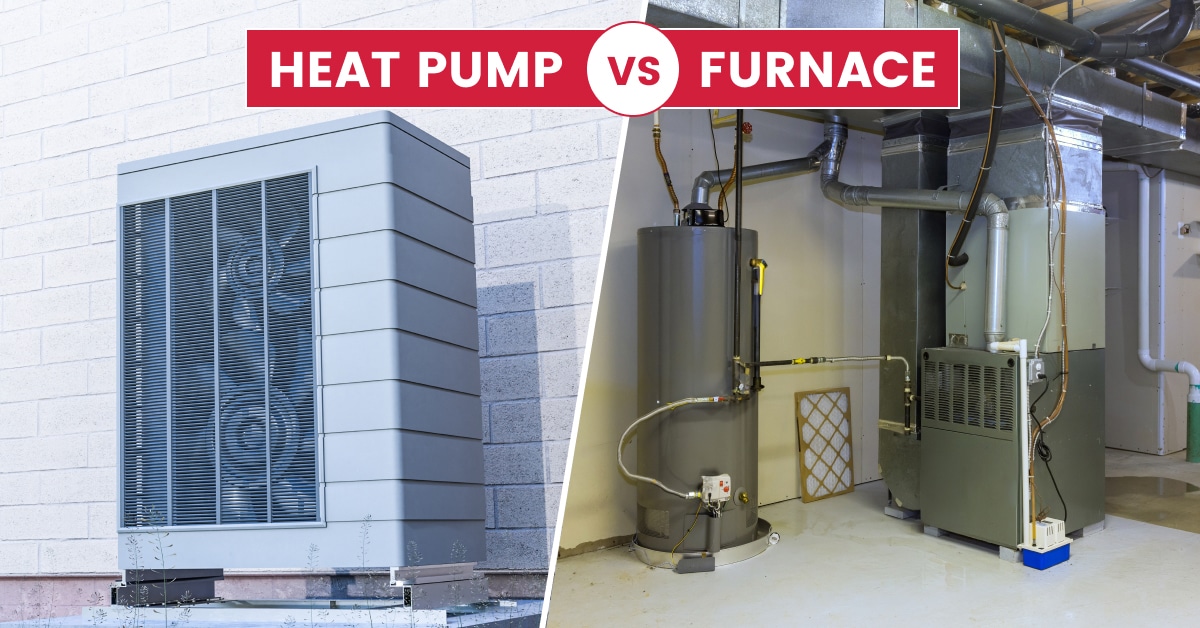April 23, 2025
Category: General,
Every month, millions of homeowners pay energy bills without ever questioning the source of the cost. You expect your home to stay warm in the winter and cool in the summer—but most people have no idea how much energy (and money) their HVAC system is actually burning through to make that happen.
And the truth is: if you’re using a traditional gas furnace and a separate AC unit, you’re probably spending more than you should be.
As Earth Day approaches, it’s worth asking not just how your home feels—but how efficiently it’s running behind the scenes. Your heating and cooling system is one of the biggest energy consumers in your entire home. That means it has the biggest potential to save—both in dollars and in environmental impact.
One technology is leading that shift: the heat pump.
If you’re thinking about comfort, costs, or carbon impact—this is the conversation you want to have.
Let’s break heat pump efficiency down.
What Is Heat Pump Efficiency, Really?
When we talk about efficiency, we’re talking about output vs input—how much heating or cooling you’re getting for every dollar you spend on energy.
Here’s where heat pumps are different from furnaces and electric heaters:
- A gas furnace burns fuel to create heat.
- An electric heater uses resistance to generate heat.
- A heat pump doesn’t create heat. It moves it from one place to another—using far less energy in the process.
That difference is everything.
According to the Department of Energy, a heat pump can operate at up to 300%–400% efficiency under the right conditions.
That means for every 1 unit of electricity, it delivers 3 to 4 units of heat.
Compare that to:
| System | Max Efficiency |
| Electric Resistance Heater | 100% |
| Gas Furnace (Standard) | ~80% |
| Gas Furnace (High-Efficiency) | ~98.5% |
| Heat Pump | 300%–400% |
Even the best gas furnace can’t touch that level of performance.
Heat Pump vs Furnace: Which Is Better?
Let’s get practical.
Gas furnaces are common for a reason. They’re reliable, produce very warm air, and perform well in cold climates. But they burn fuel to work. That means:
- Higher carbon emissions
- Price fluctuations based on gas market rates
- Even high-efficiency models lose a small portion of heat through exhaust
Heat pumps, on the other hand:
- Use electricity instead of gas
- Provide both heating and cooling
- Deliver significantly more output per unit of energy
Let’s say your gas furnace is 90% efficient. That means for every $1 you spend on natural gas, $0.90 is turned into heat.
Now compare that to a heat pump operating at 300% efficiency. You’re getting $3.00 worth of heat for every $1 of electricity.
Even when you factor in rising electric rates, the numbers usually favor heat pump vs furnace in the long run—especially in mild to moderate climates.
What About When It Gets Really Cold?
This is the one area where heat pumps have limits. When outdoor temperatures drop below freezing (around 32°F), it gets harder for the system to extract heat from the air. Heat pump efficiency drops, and the system may need help.
That’s where dual-fuel systems come in.
A dual-fuel heat pump system pairs a heat pump with a backup furnace. The heat pump handles the load in milder weather. When it gets too cold, the furnace kicks in.
Benefits:
- Keeps your energy use efficient most of the year
- Ensures reliable heat even during cold snaps
- Helps lower your carbon output overall, since the gas furnace runs less frequently
It’s a smart, balanced system—and it’s growing in popularity across northern states.
Let’s Talk Electricity Usage
One of the biggest misconceptions is that heat pumps “use more power.” Not exactly.
Yes, they use electricity—but they use it far more efficiently than electric heaters or older systems. And if your current system is gas + AC? You’re already using both gas and electricity.
Let’s put heat pump electricity usage in context:
- A heat pump can reduce electricity use for heating by up to 75% compared to baseboard or resistance heaters.
- In cooling mode, it performs as efficiently—or better—than a traditional central AC system.
As energy prices shift and more utility companies offer time-of-use rates or green energy plans, electrification becomes more strategic. You’re not just cutting costs—you’re future-proofing your home.
Heat Pump vs AC: Efficiency in Summer
You don’t need a separate system for summer.
Heat pumps act as high-efficiency air conditioners. In fact, many modern heat pumps are more efficient than older AC units, thanks to advanced inverter technology that allows them to adjust performance based on the home’s temperature in real-time.
Compare that to a traditional AC that turns on at full blast, then off, then on again.
A newer heat pump with a SEER rating of 18–22 will often outperform older AC units rated at SEER 13–16.
So instead of buying and maintaining two separate systems, you get heating and cooling in one.
Why It Matters More This Earth Day
Earth Day isn’t just a date—it’s a reminder that our home’s energy choices matter.
Heating and cooling accounts for nearly 50% of total energy use in the average U.S. home. That’s huge.
By switching to a high heat pump efficiency:
- You reduce your fossil fuel use
- You lower carbon emissions
- You position your home for cleaner energy in the future
If your electricity is coming from solar or a renewable plan, your system could be nearly emissions-free.
This is how everyday homeowners can make a real impact—with systems that use less to do more.
Do Heat Pumps Actually Save Money?
Short answer: Yes.
Let’s break heat pump vs AC efficiency down:
Upfront Cost
- Slightly higher than a furnace or AC alone
- Comparable when replacing both at once
Rebates & Incentives
- Federal tax credit: Up to $2,000 through the Inflation Reduction Act
- State/local utility rebates: Vary, but often range from $500–$2,000
Energy Savings
- Up to 50% reduction in heating costs (depending on climate and setup)
- Lower maintenance over time (no combustion = fewer parts to fail)
Over 10–15 years, the cost difference typically pays for itself—and then some.

Final Thoughts: Is a Heat Pump Right for You?
Let’s recap.
A heat pump is a strong choice if:
- You want lower monthly bills
- You live in a region with mild to cold winters
- You’re replacing both a furnace and AC
- You care about reducing your carbon footprint
- You’re looking to take advantage of Earth Day incentives
If you’re in a colder climate, a dual-fuel system gives you the best of both worlds.
Either way, the long-term benefits of heat pump vs gas furnace are hard to ignore. They’re a smarter, cleaner, and more cost-effective way to heat and cool your home. Compared to traditional systems, they deliver higher efficiency, lower operating costs, and year-round comfort—all with less impact on the environment.
And if you’re thinking about making the switch, we’re here to help you get it right the first time. At One Hour Heating & Air Conditioning®, we make it easy to upgrade your system with total confidence.
This Earth Day, we’re not just helping you save energy—we’re helping you protect your investment. When you join our Comfort Club, you get priority service, discounts on repairs, and routine system checkups that help double the life of your HVAC equipment.
Want to make energy savings and home comfort a year-round thing? This is the easiest step you can take today.
Contact us to schedule your heat pump efficiency consultation. We’ll break down your options, run the numbers, and help you make a decision that’s smart today—and even smarter tomorrow.

